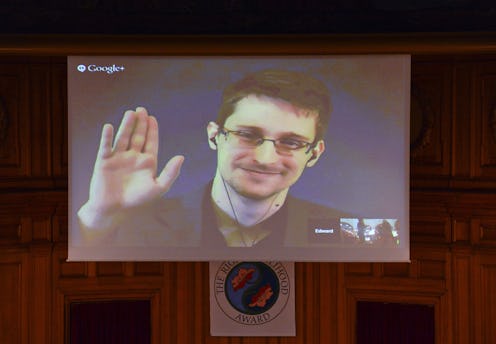On July 4, 1776, 13 American colonies declared themselves a new nation independent of the British empire. Now a federal holiday, Independence Day celebrates the freedoms that come along with being a proud American. But freedom nowadays is a tricky word. In fact, it's sometimes just a word. In America, the government doesn't assassinate people who speak sourly of the government. It doesn't ban Google. It allows its people to vote for its leaders. And those are all beautiful things. Unchecked surveillance, however, undermines the entire concept.
The ways in which our government utilizes technology is shrouded in secrecy and, quite frankly, they'd like to keep it that way. Under cover of the four gun bills that were shot down in the Senate earlier this month, for example, Senate majority leader Mitch McConnell introduced an amendment to the criminal justice appropriations bill that would allow the Federal Bureau of Investigation to indiscriminately collect masses of emails and browsing history.
The argument over government surveillance and metadata erupted when Edward Snowden disclosed NSA documents to Guardian journalist Glenn Greenwald. Upon the resulting article's release, some cell service subscribers found out that their phone records were being grabbed daily by the government. Regardless of whether you believe Snowden is a hero or villain, Americans would have never been aware of the fact they're essentially being watched for no reason whatsoever. What's worse is that by law, the service provider wasn't allowed to let the public know the government had requested a massive bulk of their phone history.
During an episode of HBO's Vice, Shane Smith asked Snowden whether he thought privacy in the U.S. has improved since 2013. His answer wasn't comforting. And the case of the San Bernardino shooter's phone is a perfect example of how the government is still attempting to collect even more information than it already can. As Snowden predicted, the government didn't need help to unlock an single iPhone. They succeeded without help just weeks later. In a customer letter explaining why the company refused the FBI's request, Apple chief executive Tim Cooke explained the importance of limiting surveillance.
The FBI may use different words to describe this tool, but make no mistake: Building a version of iOS that bypasses security in this way would undeniably create a backdoor. And while the government may argue that its use would be limited to this case, there is no way to guarantee such control.
If these measures were successful, I wouldn't be complaining. But in reality, the efficacy of surveillance measures is extremely unclear. Searching for terrorist activity while scanning through metadata, for example, could be likened to finding a needle in a haystack. Even so, Obama defended the method after Snowden first released the documents and said the NSA has never abused its authority, a claim that would later be disproved, according to The Guardian.
By sifting through this so-called metadata, they may identify potential leads with respect to folks who might engage in terrorism. If the intelligence community then actually wants to listen to a phone call, they've got to go back to a federal judge just like they would in a criminal investigation.
The most basic concern over the government's increasing level of surveillance was posed by Smith during his interview with Snowden. He said:
A police state is where the government can watch everything you do ... They know everything about you and your whole history. And they can use that to prosecute you. That just happened overnight and we found out about it we went 'I guess so.' It's just — I find it baffling actually.
America is allegedly the "land of the free." But are we really free if our every move can be monitored by someone invisible to us? It seems as though we've retaliated against nearly every other violation of personal freedom. Somehow, however, the firestorm surrounding surveillance has grown placid. The NSA scandal may have caused an uproar initially, but the agency is continuing to do what it's always done. And that's important to be aware of, because in this case, ignorance isn't bliss. Invisible power is unchecked power.
